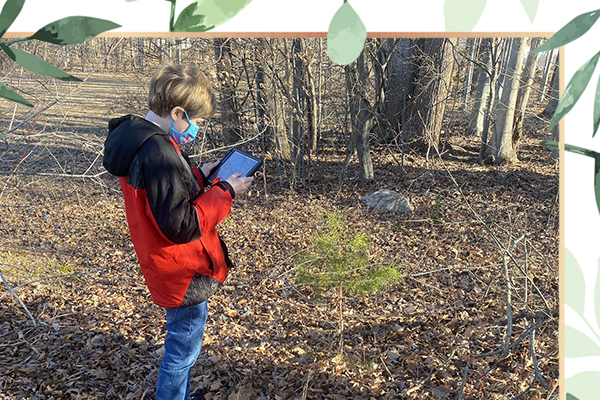 Jennifer
Dittamo's
third-grade
class
at
King
Elementary
School
recently
discovered
some
unique
plants
during
a
scavenger
hunt.
The
activity
was
part
of
their
unit
on
plant
adaptations.
Because
of
concurrent
learning,
not
only
did
students
learn
about
plants
at
their
school,
but
at
their
homes
too.
Jennifer
Dittamo's
third-grade
class
at
King
Elementary
School
recently
discovered
some
unique
plants
during
a
scavenger
hunt.
The
activity
was
part
of
their
unit
on
plant
adaptations.
Because
of
concurrent
learning,
not
only
did
students
learn
about
plants
at
their
school,
but
at
their
homes
too.The third grade Standards of Learning (SOL) tests cover plant and animal adaptations. For plants, students learn about the physical adaptations such as thorns, bark, and the size and shape of leaves that help the plant to survive. They also study behavioral adaptations of plants such as dormancy and falling leaves.
Dittamo's in-person students searched for plants in the schoolyard, and using iPads, took photos of what they found. The virtual students looked for and took pictures of plants outside and inside of their homes. Both groups of students shared their pictures.
"We benefitted from not being limited to only plants in the schoolyard. They found more interesting plants around their homes than at school," Dittamo explained. "At school students found kind of "normal" things like pine trees, dormant trees, and thorn bushes. At home they found rose bushes, orchids, succulents, and one student had a eucalyptus tree," Dittamo added.
Students enjoyed the activity. Conner said, "It made me free to explore what I wanted to explore instead of being told what to do." Classmate Stella added, "I liked going outside and looking at cool plants to find their adaptations."
The plant observations inspired some students to do more research on the plants they found. They learned that eucalyptus seeds are adapted to survive in a fire. Orchids have something called "tubers" which help store water, but succulents have thick leaves to store water. And thorns deter animals from eating a plant.
Dittamo explained that she likes to do hands-on lessons with her students, especially when it comes to science. "The outdoors is a natural place to find science. So, my hope is that if I can take them outside to look at the trees and plants, then they will continue the discussion with their families when they're out for a family walk or visiting a park. I hope that these types of activities are only the beginning of the conversation," Dittamo shared.
